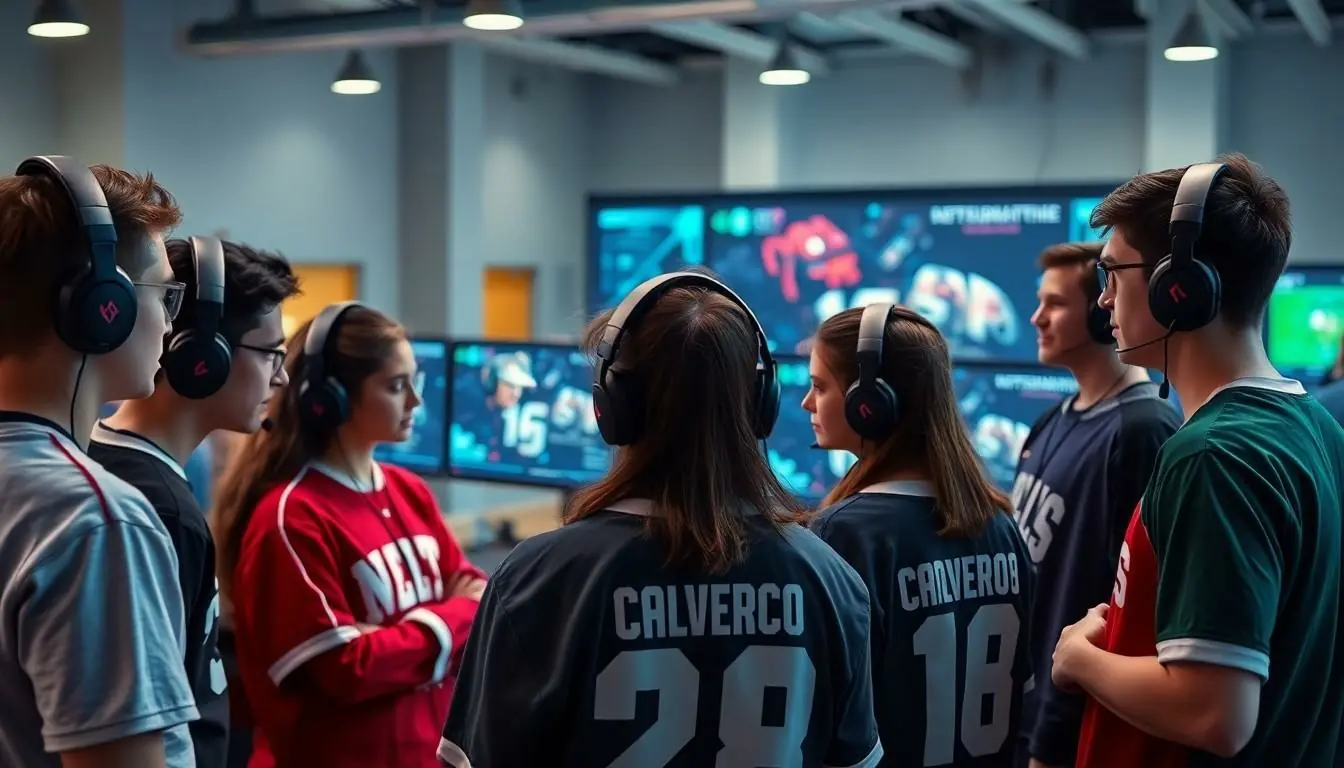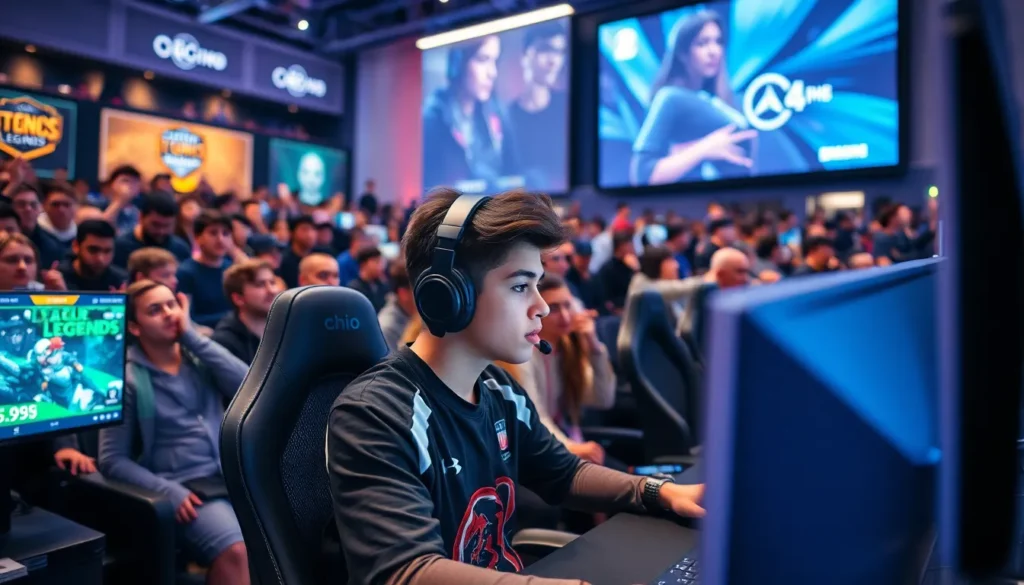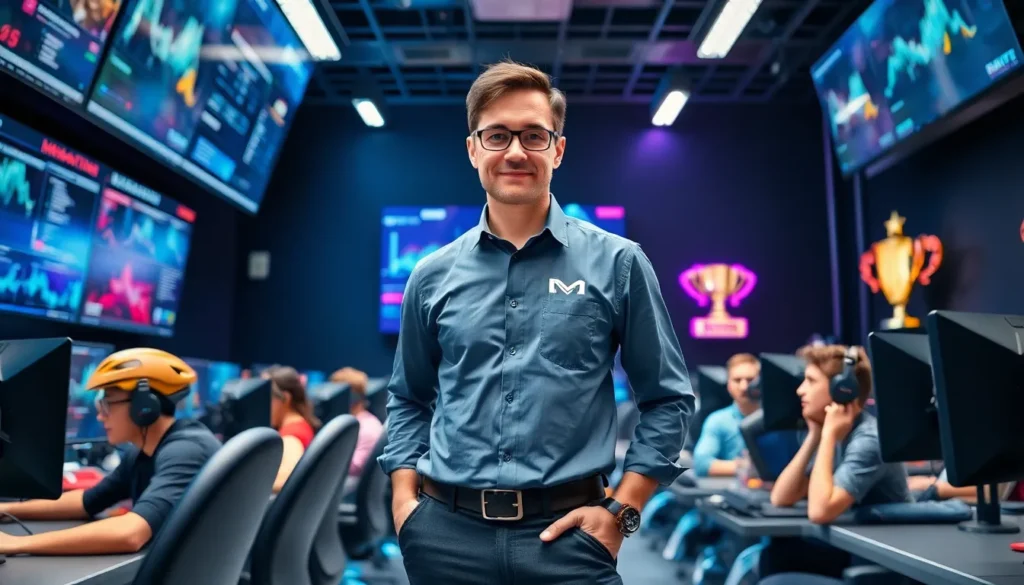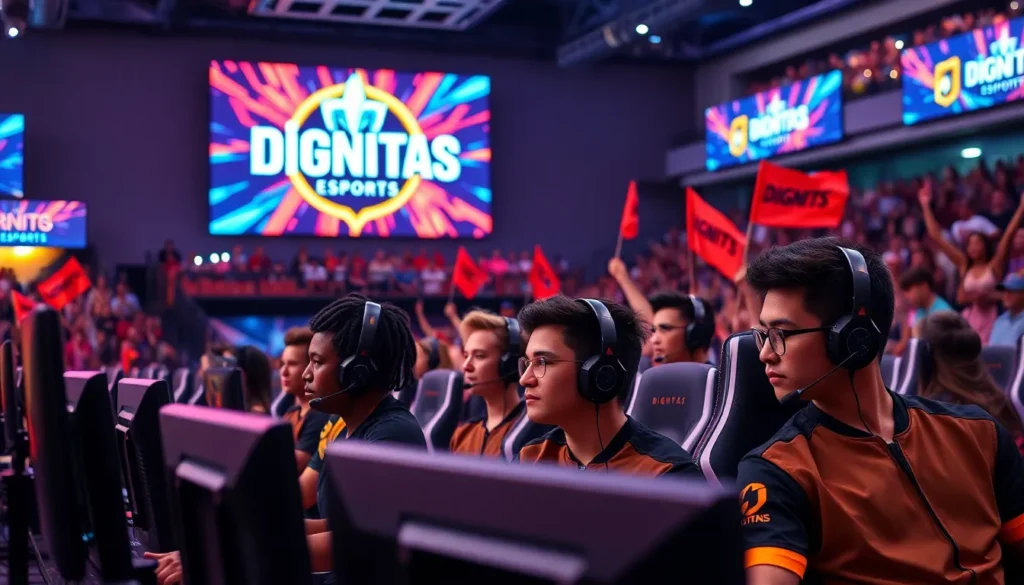In the world of higher education, textbooks and lectures are getting some serious competition from the virtual arena. College esports teams are taking campuses by storm, turning gaming enthusiasts into professional athletes faster than you can say “level up.” These teams aren’t just about late-night gaming sessions and pizza; they’re cultivating skills like teamwork, strategy, and even a bit of sportsmanship—who knew fragging your opponents could be so educational?
As universities embrace this digital revolution, students are trading in their traditional sports jerseys for gaming headsets. With scholarships and tournaments on the rise, joining a college esports team isn’t just a hobby; it’s a ticket to fame, fortune, and maybe even a few viral moments. So grab your controllers and prepare for a deep dive into the thrilling world of college esports, where every match could be the start of something legendary.
Table of Contents
ToggleOverview of College Esports Teams
College esports teams have experienced significant growth in recent years within higher education. These teams provide students an opportunity to compete in popular video games while developing critical skills like teamwork, strategy, and sportsmanship. Student-athletes engage in rigorous practice schedules and learn how to work collaboratively toward common goals.
Competitive play often takes place in tournaments that universities host or participate in, generating enthusiasm among participants and fans alike. Scholarships specifically for esports athletes are becoming more common, encouraging a diverse and talented pool of players. Many colleges are recognizing the potential benefits of building esports programs, including increased student engagement and recruitment.
Various games, including League of Legends, Overwatch, and Fortnite, dominate the collegiate esports scene. Schools often create ecosystems that support gamers through dedicated coaches, practice facilities, and community events. Student-driven initiatives frequently propel these programs, demonstrating the passion and commitment within the gaming community.
Administrators recognize that esports can enhance the college experience by providing networking opportunities and fostering a sense of belonging among students. As the industry continues to expand, many universities are forging partnerships with professional esports organizations, further legitimizing college esports teams. This collaboration paves the way for students to explore career opportunities in this rapidly growing field.
Participation in college esports teams not only cultivates professional skills but also contributes to personal development and academic achievements. Engaging in this innovative environment shapes students into well-rounded individuals, prepared for challenges beyond the virtual arena.
Benefits of College Esports Teams
College esports teams provide various advantages for students, enhancing their educational and personal lives in significant ways.
Academic Advantages
Participating in college esports teams promotes academic success. Research shows that students involved in structured gaming environments maintain better grades than their peers. Time management skills improve as student-athletes balance practice and study schedules. Faculty support often increases for these students due to the discipline seen in esports. Scholarships create financial incentives, encouraging students to pursue higher education. Additionally, esports programs often include academic support, mentoring students toward graduation. Engagement in competitions sharpens critical thinking and problem-solving abilities essential in academics and future careers.
Social and Networking Opportunities
Joining college esports teams fosters valuable social connections. Students interact with peers who share similar interests, enhancing their college experience. Through team events, relationships flourish outside of the gaming world. Networking opportunities arise during tournaments, allowing participants to meet industry professionals and potential employers. Professional connections often form through university partnerships with esports organizations. Those engaged in esports face fewer barriers when forming friendships, contributing to a sense of community on campus. Participation in these teams equips participants with interpersonal skills vital for life beyond college.
Challenges Facing College Esports Teams
Challenges exist for college esports teams, encompassing various aspects like funding and academic balance.
Funding and Resource Allocation
Funding poses a significant challenge. Universities often prioritize traditional sports when allocating budgets, leading to limited resources for esports programs. Many colleges struggle to provide necessary equipment, training facilities, and coaching staff. Additional support from sponsorships and partnerships can alleviate financial strains, yet they remain inconsistent. Teams often rely heavily on student initiators to organize events and fundraising activities. Ensuring sustainable funding is crucial for the growth and success of these programs. Scholarships dedicated to esports players are emerging, but they still account for a small percentage of overall funding opportunities compared to traditional athletics.
Balancing Academics and Competition
Balancing academics and esports competition proves essential for student-athletes. Students face intense pressure to perform in both areas, which can lead to stress and burnout. Many esports teams require rigorous practice schedules, potentially conflicting with class times and study periods. Faculty support is crucial, yet not all educators understand the commitment involved in collegiate gaming. Those who manage their time effectively often see enhanced academic performance alongside competitive success. Developing strategies for balancing these commitments contributes significantly to student well-being and academic achievement. Structuring practice around academic responsibilities can also foster a healthier college experience overall.
Notable College Esports Teams
Collegiate esports teams are making headlines with impressive achievements and innovative programs. Several institutions have carved out significant niches in the competitive gaming landscape.
Success Stories
University esports teams like Robert Morris University and UC Irvine have gained national recognition. These schools not only excel in competitions but also build strong community support. For instance, the University of Texas at Dallas’ team made remarkable strides by clinching championship titles in multiple tournaments. Their accomplishments highlight the potential for student-athletes to thrive in both academics and gaming. Notably, Northwood University became the first school to provide full scholarships to esports athletes, setting a precedent for others. Such achievements reinforce the idea that dedication to esports can lead to substantial opportunities in higher education and beyond.
Unique Programs and Approaches
Many colleges adopt distinctive strategies to foster their esports programs. For example, Harrisburg University integrates esports with its business curriculum, allowing students to explore marketing and management in a competitive environment. Additionally, Arizona State University invests in state-of-the-art facilities and coaching, ensuring that student-athletes have access to the best resources. Some institutions emphasize inclusivity by supporting female gamers through dedicated teams and initiatives. Furthermore, schools like the University of Kentucky incorporate mental health resources within their programs, promoting overall well-being among players. These approaches demonstrate that college esports teams can be more than just competitive entities; they serve as platforms for personal and professional development.
The Future of College Esports Teams
Projected advancements in college esports reveal substantial growth opportunities for institutions and students. Increased funding for esports programs can improve facilities, equipment, and coaching staff, directly enhancing player performance. Diverse scholarship options aim to attract a wider range of talent, allowing schools to build competitive teams.
Engagement from the gaming community encourages schools to recognize esports as a legitimate avenue for talent development. Moreover, partnerships with professional esports organizations offer pathways for student-athletes to transition into careers within the industry. Networking opportunities arise during tournaments, providing students the chance to connect with industry leaders.
Dedicated academic support structures support student-athletes in balancing gaming and education responsibilities. Research continuously shows that participating in esports correlates with better academic performance, enhancing critical thinking and time management skills. Events focused on team-building not only improve interpersonal relationships but also strengthen campus communities.
Challenges persist, particularly around funding disparities and academic pressures faced by student-athletes. High priorities for traditional sports can lead to limited resources for esports, necessitating student-initiated fundraising and organizing efforts. Managing academic commitments alongside gaming competition requires disciplined time management, allowing players to thrive without compromising their education.
Innovative strategies can boost collegiate esports programs significantly. For example, some schools integrate esports into curricula, enhancing learning experiences through gaming. Others focus on inclusivity, ensuring that environments are welcoming for all students, including female gamers, and providing mental health resources.
These approaches show that college esports teams play crucial roles in student development beyond competition. As the landscape evolves, participation in these teams fosters professional growth and personal development, equipping students for future challenges both within and outside the gaming world.
Conclusion
The emergence of college esports teams marks a significant shift in higher education. These teams not only cultivate essential skills but also foster a sense of community among students. With growing support from universities and the gaming industry, student-athletes are carving out new pathways to success both in gaming and academics.
As the landscape evolves, innovative strategies will continue to enhance the collegiate esports experience. The potential for personal and professional growth is immense, making participation in college esports an attractive option for aspiring gamers. The future looks promising as these teams pave the way for a new generation of leaders in both the gaming and academic worlds.












